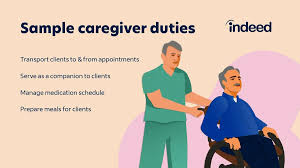Caregivers play a pivotal role in furnishing essential support and backing to individuals unfit to watch for themselves due to age, illness, disability, or other circumstances. This composition explores the significance of caregiver jobs, the liabilities involved, needed qualifications, and the satisfying aspects of this profession.
The Significance of Caregiver Jobs
Caregivers contribute significantly to their guests’ well-being and quality of life by offering colorful types of support.
1. Personal Care
aiding with the conditioning of daily living (ADLs), similar to bathing, dressing, fixing, toileting, and feeding.
2. Medical Assistance
Administering specifics, covering vital signs, and furnishing introductory medical care under the supervision of healthcare professionals.
3. Emotional Support
Offering fellowship, harkening, and furnishing stimulants to guests facing physical or internal challenges.
4. Household Management
Performing light housekeeping tasks, mess medication, grocery shopping, and running errands for guests.
Liabilities of Caregivers
Caregiver liabilities may vary depending on the specific requirements and conditions of the customer but generally include
Monitoring Health
Observing and reporting changes in the customer’s health or condition to healthcare professionals or family members.
Providing Safety
Creating a safe terrain by precluding cascades, accidents, and other hazards.
Maintaining Records
Keeping accurate records of care handed, specifics administered, and any significant compliances.
Furnishing fellowship
Engaging guests in meaningful conditioning, discussion, and emotional support.
Qualifications and skills are needed. While formal education conditions for caregivers may vary, essential qualifications and skills include
Compassion and Empathy
Genuine care and understanding for the well-being of others.
Tolerance and flexibility
Ability to acclimatize to changing situations and handle challenges calmly.
Physical Stamina
Stamina and strength to help guests with mobility and physical tasks.
Communication Skills
Clear communication with guests, families, and healthcare professionals.
Problem-Solving Skills
Ability to assess situations and form opinions in the style of the customer.
Career Openings and Settings
Caregivers work in colorful settings, including
Home Care Agencies
Furnishing care to guests in their own homes.
Supported Living installations
Assisting residents with diurnal conditioning in a community setting.
Hospitals and Nursing Homes
Supporting cases and residents under the supervision of medical staff.
Challenges and Rewards
Caregiving can be emotionally and physically demanding, requiring fidelity and adaptability. Still, it’s also profoundly satisfying.
Making a Difference
Directly impacting guests’ lives by perfecting their quality of life and furnishing comfort.
Building Connections
Developing meaningful connections with guests and their families.
Particular Growth
Gaining previous experience in healthcare and enhancing interpersonal chops.
Advancing in the Field
Caregivers can advance their careers by
Pursuing Degrees
Pursuing degrees like CNA or Home Health Aide (HHA) to enhance skills and job prospects.
Continuing Education
Sharing in shops, forums, or online courses to streamline caregiving ways and healthcare practices.
Specializing
To develop grit, focus on specific areas like madness, lodge, or pediatric care.
Conclusion
Caregiver jobs are necessary for furnishing essential care and support to individuals who need backing due to age, illness, or disability. This profession requires compassion, empathy, and fidelity to perfecting the lives of others. As the demand for caregivers grows with a growing population, this career offers meaningful openings to positively impact and contribute to healthcare assiduity. For those considering a career in caregiving, it promises challenges and profound rewards in helping others live with quality and comfort.

